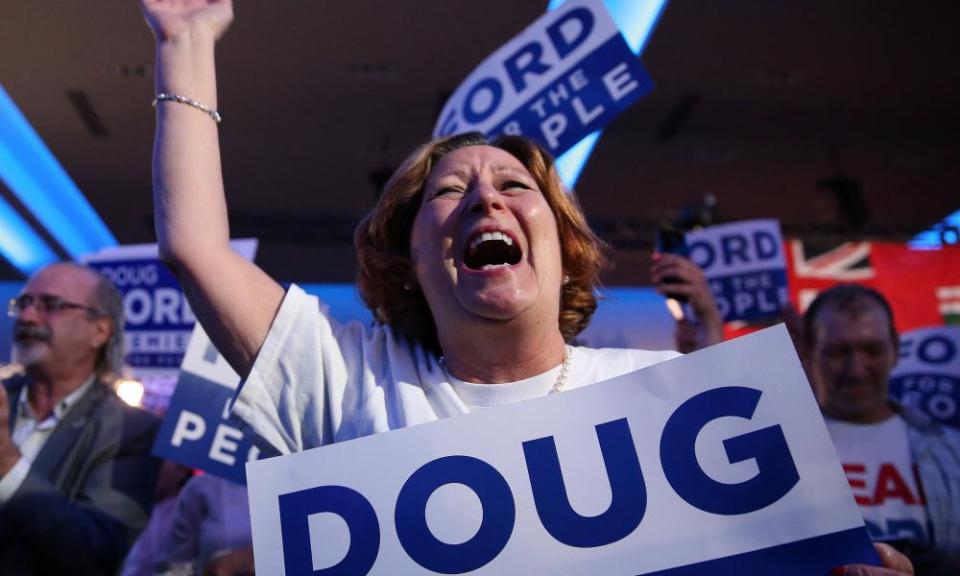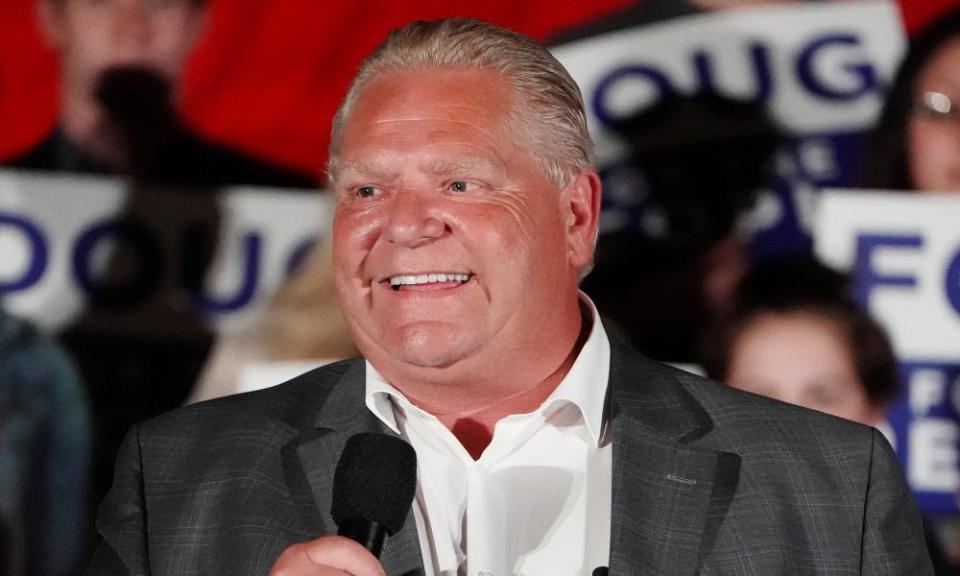Ontario election results: populist Doug Ford to become premier
The brother of troubled late former Toronto mayor Rob Ford to become leader of Canada’s most populous province

Doug Ford – the brother of controversial former Toronto mayor Rob Ford – is the new leader of Canada’s most populous province, winning a majority government in a local show of strength for the divisive wedge politics that have rattled much of the world.
Ontario’s Conservatives, led by Ford, won 76 of the 124 seats in the province, with 99% of the polls reporting. Buoyed by promises that included slashing income taxes, reducing the price of gasoline, boosting spending on healthcare and transit and repealing carbon pricing, the Conservatives won 41% of the vote, bringing an end to 15 years of Liberal rule in the province.
“This victory belongs to the people,” Ford told supporters on Thursday. “Together we made history. We have taken back Ontario, we have delivered a government that is for the people.”
Ford – a businessman who rails against the elite and regularly peppers his speeches and interviews with boasts and falsehoods – is the brother of Rob Ford, the former Toronto mayor who made headlines around the world after he admitted to smoking crack cocaine while in office.
In his victory speech, Ford thanked his brother. “I know my brother Rob is looking down from heaven. I’m just getting chills talking about him right now,” he said. “I know Rob is celebrating with us tonight. We owe so much to Rob’s legacy.”
Throughout the campaign Ford’s brand of populism prompted a slew of comparisons to Donald Trump, as the Canadian leader took aim at safe injection sites and opposed legislation to create protest-free zones outside abortion clinics. But in contrast to Trump, he campaigned hard among Canada’s immigrant communities who hold considerable sway in several ridings in the province.
He has long been a controversial figure in Canada; during his one term as a Toronto city councillor he refused to attend the city’s Pride parade – describing it as “middle-aged men, with pot bellies, running down the street buck naked” – and lashed out at a home for developmentally disabled youth, labelling it a “nightmare” that had “ruined the community”.

Ford will now lead Ontario, a province that is home to nearly a third of Canada’s 36 million residents as well as much of the country’s financial and manufacturing sectors.
In some ways, Ford’s win echoes the rise of populism in countries such as Poland, Hungary and Italy, said Ian Lee, a professor at Carleton University. “He’s very much a populist,” he said.
But he pointed to different underlying reasons. “I don’t believe that this is part of the bandwagon or the trend that we’re seeing in the US, in Poland, in Hungary, in other countries in Europe.” Instead he saw Ford’s victory as a rejection of the governing Liberals, who had steered the province to the left during their 15 years of rule.
The Liberals, led by premier Kathleen Wynne, were reduced to seven seats – one seat shy of the eight needed for official party status. Pollsters had long predicted that voter frustration about growing inequality, the rising cost of living and economic uncertainty would take a toll on her party.
As the results came in, Wynne, Ontario’s first female premier as well as its first openly gay premier, announced that she would step down as party leader. “I am passing the torch,” she said.
Some of the deep clamour for change emerged simply from the fact that the Liberals had governed the province for 15 years – a lengthy stretch of time for any political party, said Cristine de Clercy, a political science professor at Western University in southern Ontario.
But the dizzying pace of initiatives rolled out by Wynne’s government might have also played a role, said de Clercy, citing a hike in the minimum wage and reforms in workplace legislation and education as examples. “She asked Ontarians to embrace many initiatives very quickly and I think certainly in some sectors people pushed back.”
What few predicted, however, was that the race would become a battle between the Conservatives and the left-leaning New Democratic party (NDP); pitting the rightwing populist politics that have taken hold in countries around the world against promises to increase government spending and raise taxes on corporations and the wealthy.
Led by Andrea Horwath, the NDP earned 34% of the vote. Voter distribution – combined with Ontario’s first-past-the-post electoral system – translated the vote into 39 seats for the party. The party will now form the official opposition in the Ontario legislature.
“It’s going to be a very different legislature that convenes,” said de Clercy. “It’s worth remembering Mr Ford is a total rookie. He has not participated in Ontario politics, he doesn’t know the ways and means of the legislature. There is a pretty steep learning curve for him, as there would be for any politician in his shoes.”

